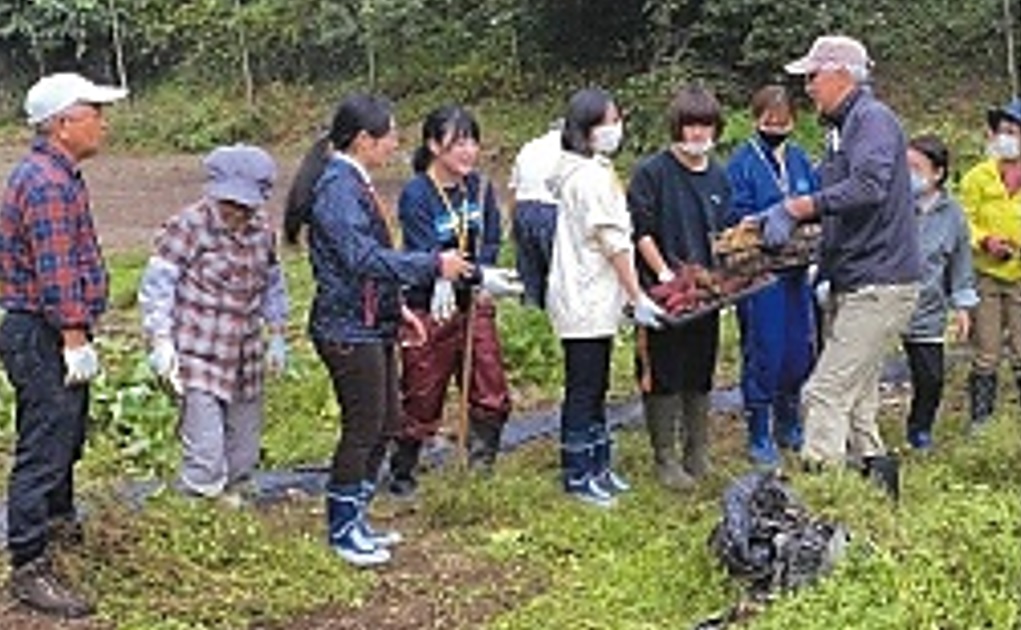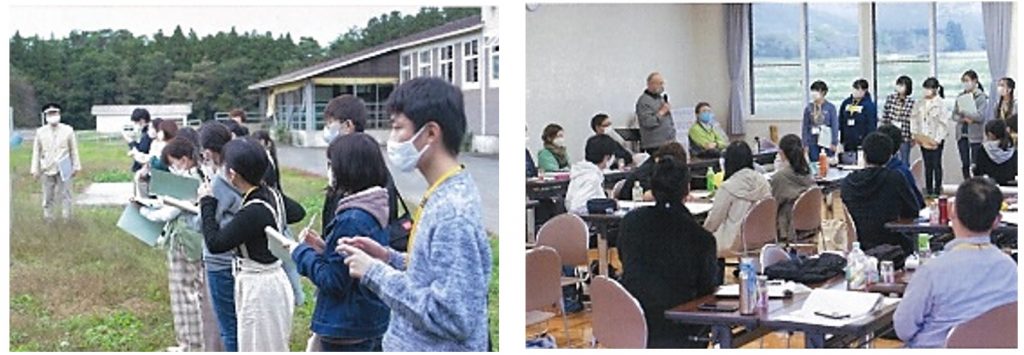2022.02.05
Regional Development Program in Liberal Arts Education
- Principle 6: Encouraging global citizenship through education
- Principle 9: A commitment to promoting sustainability through education
The major classes of this program are “Iwate Regional Development Studies I”, “Iwate Regional Development Studies II”, and “Actual Practice in Iwate Research”
Iwate Regional Development Studies I
“Iwate Regional Development Studies I” is a class to develop not only basic-learning methods for the regional community, but also the ability to find out local resources and local issues through all five senses in specific areas of the prefecture. In addition, by presenting the learning outcomes to local people, it is intended to acquire the ability to understand and explain their learning logically and organically.
Iwate Regional Development Studies II
The students of “Iwate Regional Development Studies II” have to be responsible for planning and managing the regional study of “Iwate Regional Development Studies I”. As a result, students acquire the abilities of communicating with local residents and the designing of projects. Here, students make full use of the methods of regional community learning acquired in “Iwate Regional Development Studies I” and the ability to find out local resources and local issues.
Actual Practice in Iwate Research
This is a capstone subject of the program and is a class that serves an overall wrap-up. The goal is that students should point out local issues and implement methods for solving them on their own. Therefore, there are more opportunities to actively interact with the local community than “Iwate Regional Development Studies I” and “Iwate Regional Development Studies II”. Students must go to a region many times to find existing resources and issues, and to verify over and over again how they can be combined to provide an appropriate solution. In addition, the “Actual Practice in Iwate Research” is a half-year class, and thus schedule management is also important in order to move toward its realization in this limited time.
Results of the 2020 Fiscal Year:
The class conducted local learning in three areas: Nishiwaga Town, Miyako City, and Shizukuishi Town. Nishiwaga Town has the highest aging rate in the prefecture and strives for the slogan of human health and happiness. Setting up this slogan as a keyword, students tried to contact with hospital officials and migrants from the outside of the prefecture and look into current issues.
In Miyako City, the students had the plan to learn how this city is revitalizing as we pass 10 years since the Great East Japan Earthquake and Tsunami. And then, they went to see persons who were actively engaged in various fields in this city, and discussed the earthquake recovery.
In Shizukuishi Town, the students focused on green tourism, visiting sites that are actually active in the tourism business, and had the chance to gain experience, and interact with the local people.
Both program-classes were held on a Saturday and Sunday in October. The students of “Iwate Regional Development Studies I” understood their two-day learning, and acquired the ability to summarize and explain details in an easy-to-understand manner for the debriefing session in November. The students of “Iwate Regional Development Studies II” planned the 2 day-course for “Iwate Regional Development Studies I”, spending 5 months preparing, and achieved many learning outcomes.
Awarding of “Specialist in Regional Development” (Mini-Degree)
In fiscal 2020, 6 students completed all curriculums and were awarded the title of “Specialist in Regional Development”. The following message was received from the student who greeted the audience as a representative at the award ceremony:
“I think I was able to gain communication skills by jumping into the community and working with the residents, and at the same time I also gained the ability to think in order to grasp and solve local issues, and until then I had tried to do it all by myself, but I was able to believe in my friends and enjoy it with my friends.”
Academic Impact Annual Report 2020: 00 UNAI_2020_en 01-03.pdf
Recent Articles
-
2026.01.22
The United Nations Academic Impact Report on Activities 2024 -
2025.02.20
The United Nations Academic Impact Report on Activities 2023 -
2024.02.05
The United Nations Academic Impact Report on Activities 2022 -
2023.03.06
The United Nations Academic Impact Report on Activities 2021 -
2022.02.05
2020 UNAI Activity Report


















































































































